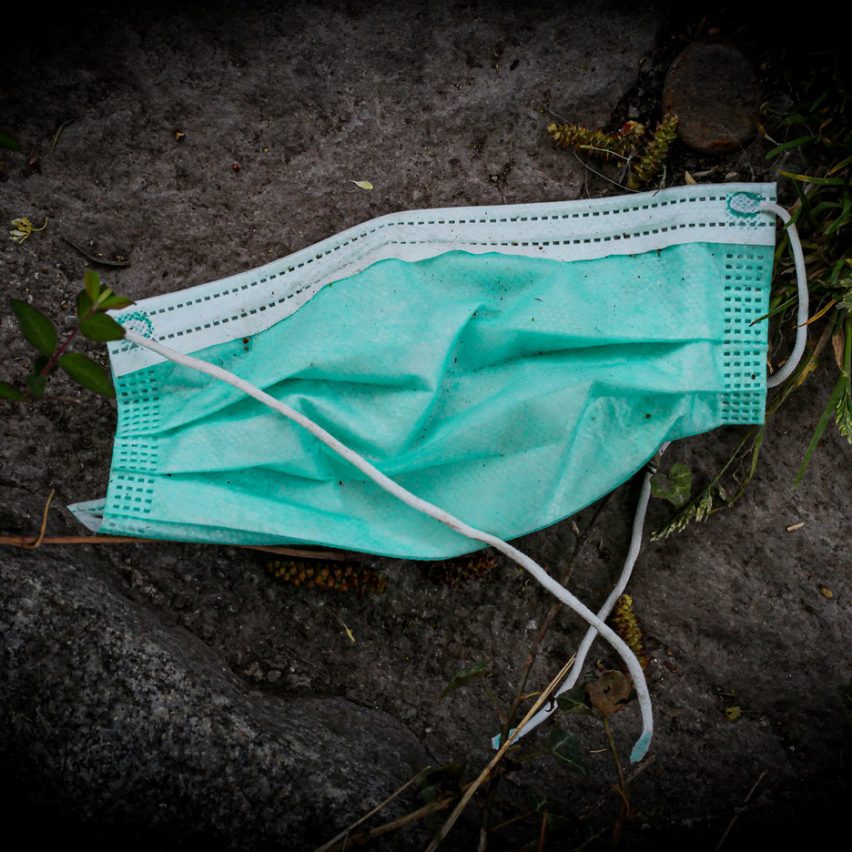
The coronavirus pandemic is increasing demand for plastic and delaying the drive towards sustainable alternatives, say designers.
Nienke Hoogvliet, a designer who explores sustainable materials, said people now "focus only on safety and the environment is forgotten," while Parley for the Oceans founder Cyrill Gutsch said people "went back to old patterns" of plastic use during the pandemic.
"There was a moment of wastefulness," Gutsch said during a live interview with Dezeen.
"I'm worried about the increased amount of virgin plastic being used," agreed industrial designer Dave Hakkens, whose Precious Plastics initiative encourages recycling. "It seems that most people prioritise the pandemic and put the environment second."
Disposable face masks litter the streets
Plastic is used to make personal protective equipment (PPE) such as disposable masks and gloves to help with infection control, while restaurants are using disposable cups and cutlery as they reopen as takeaway-only.
"There's a global trend that single-use plastics are increasing again," Hoogvliet told Dezeen. "The amount of discarded face masks I have seen in the streets already is daunting."
"That's why I was so happy to see Adidas release a reusable face cover. Why won't governments oblige people to wear reusable face masks?"
Hoogvliet, who founded her own studio in 2013, has used algae to make rugs, turned reclaimed toilet paper into tableware, and developed a bioplastic from wastewater.
Balance "is extremely difficult to achieve"
While protecting public health is vital, Hoogvliet argued that damaging the environment will cause more global health crises further down the line. "I think it's great that plastic materials can offer help in this pandemic," she said.
"But on the other hand, I am deeply worried. The balance between health, economics and environmental impact is extremely difficult to achieve, but also extremely important. There still is too much talk and not enough action."
Bans on single-use plastic bags have been lifted in some US states and reusable bags banned over fears about transmission. Greenpeace has accused the plastics industry of "exploiting anxiety" after its trade body lobbied the US department of health to roll back bans on single-use plastics, calling them a "public safety risk".
People "put environment second"
In the UK, a planned ban on disposable plastic objects such as stirrers and cotton buds has been delayed due to the pandemic.
"I'm worried about the increased amount of virgin plastic being used," Hakkens told Dezeen. Precious Plastics, the open-source recycling project Hakkens founded in 2013, helps people build their own machines to turn plastic waste into new objects.
Historically low oil prices, caused by the pandemic halting transport and industry, are also making single-use plastic items cheaper to produce. The falling cost to produce virgin plastic could lead to a drop in demand for recycled plastic.
Coronavirus "came in like a bomb," Hakkens said, leading to an understandable explosion of single-use plastic consumption, but he fears that the environment will suffer in the long term.
"Some plastics are easy to recycle but some of the commercial masks are impossible to recycle and will all go to burn. It's the same with the increased amount of gloves and food delivery packaging." he told Dezeen.
Material "wasted" during pandemic
However, Hakkens is heartened by the DIY recycling community's response to the pandemic, as Precious Plastics mobilised to make recycled PPE.
"On the upside [the pandemic] definitely seems to spark the imagination in people's minds that rapid change is possible," said Hakkens. "Hopefully we can keep using that force to work on our other environmental issues as a collective once this is settled."
Gutsch, a designer and product developer, founded Parley for the Oceans in 2012 to foster creative collaborations to protect the marine environment.
"We definitely wasted a lot of material in the last two months, and we went back to old patterns," Gutsch told Dezeen. "What it did, though, is it changed us."
Even environmental boons such as the grounding of flights will only be temporary, but it has opened a window for long term behavioural change, Gutsch said in an interview with Dezeen last week as part of Virtual Design Festival.
Governments must invest in alternatives now
The pandemic has also highlighted the weaknesses of supply chains and the difficulty of producing new products, he warned. The only way to truly stop plastic pollution, Gutsch believes, is to invest in non-toxic biofabricated alternatives using living materials such as algae and bacteria.
"I think biofabrication will replace pretty much everything in the next 10 years," he said. The Parley Institute for Material Science is already working on supporting the development of alternative materials.
These new products will need major investment to be able to compete on a scale with plastic. So now is not the time for environmental projects to lose momentum, argued Hoogvliet.
"Worldwide governments should be pushing for new alternatives and regulations, not passively let happen whatever happens," she said.
"It's a perfect moment for new innovations since many companies are facing difficulties with their normal productions, this is the time to research and change. With government support, this could accelerate even more or easier, but unfortunately, I don't see that happening yet."
The main image is by Jasmin Sessler from Pixabay.
The post Designers "deeply worried" as pandemic slows move away from single-use plastics appeared first on Dezeen.
from Dezeen https://ift.tt/2YLdJz8

No comments:
Post a Comment